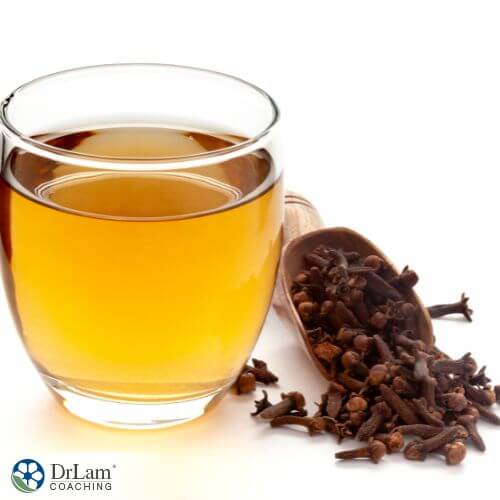 The societal shift to using more natural products for their health benefits is getting increasingly more pronounced. Among the different natural products used, cloves are among the standouts. Several clove water benefits have been identified, especially for perimenopausal women. However, before you can enjoy these benefits, there are other important details to consider, like how to make clove water in the first place! Here’s what you need to know.
The societal shift to using more natural products for their health benefits is getting increasingly more pronounced. Among the different natural products used, cloves are among the standouts. Several clove water benefits have been identified, especially for perimenopausal women. However, before you can enjoy these benefits, there are other important details to consider, like how to make clove water in the first place! Here’s what you need to know.
Clove water is an herbal tea that is obtained by boiling or infusing cloves in water. Occurring as flower buds of the evergreen clove tree (Syzygium aromaticum), cloves have been used medicinally and as spices for hundreds of years.
The purpose of use typically dictates the form in which the cloves are consumed. Cloves are generally used in their whole or ground form for culinary purposes. However, making the cloves into a tea has been the preferred method for medicinal purposes. This tea is also known as clove water.
Perimenopause literally translates to “around menopause,” and it refers to the transitional period to menopause. During the perimenopausal stage, pregnancy is still possible as the body is still ovulating, but the signs and symptoms of menopause start to become more prominent. For instance, irregular periods, hot flashes, digestive disturbances, and decreased libido may occur.
While perimenopause is not an illness or sickness, its attendant symptoms can significantly decrease your quality of life. For this reason, many women turn to different products to relieve their symptoms. Research has shown that clove water has benefits that can help mitigate perimenopausal symptoms.
There are several different clove water benefits for perimenopause symptoms. Clove water benefits include:
Hot flashes are sudden feelings of warmth in the upper body, usually more intense around the face, neck, and chest. When hot flashes occur at night, they are called night sweats, lasting up to five minutes, and may impact sleep quality. The frequency and intensity of these flashes differ from woman to woman.
Clove water benefits perimenopausal women with hot flashes because of the high content of isoflavones and phytoestrogens in cloves. Both of these compounds can exert estrogen-like effects, thereby relieving menopausal symptoms, as these symptoms arise due to the fluctuations in the hormone estrogen.
According to studies, isoflavones can reduce the frequency and severity of hot flashes in perimenopausal women.1 While there is still no consensus on the exact dosage required, the safety profile of isoflavones is also high enough not to cause medical practitioners any worry.
Clove water benefits apply to the immune system, mainly because of the antioxidant properties of eugenol, one of clove’s constituents. By reducing inflammation, clove water can help support the immune system. Also, the anti-inflammatory properties of clove water help prevent and manage other health conditions, including Adrenal Fatigue Syndrome (AFS).
 Adrenal fatigue is a non-Addison's type of adrenal dysfunction in which the body’s stress response cannot keep up with life's chronic stressors. This condition often results when one or more NeuroEndoMetabolic (NEM) Stress Response circuits are dysregulated. The NEM is the natural stress-coping mechanism consisting of six circuits of related organs that work to reduce stress.
Adrenal fatigue is a non-Addison's type of adrenal dysfunction in which the body’s stress response cannot keep up with life's chronic stressors. This condition often results when one or more NeuroEndoMetabolic (NEM) Stress Response circuits are dysregulated. The NEM is the natural stress-coping mechanism consisting of six circuits of related organs that work to reduce stress.
The Inflammation circuit is the NEM circuit concerned with managing inflammation in the body. In the face of constant stressors on this circuit, adrenal fatigue may result. However, with the aid of antioxidants, as are present in clove water, the body can effectively manage the resulting inflammation and keep the immune system optimally functioning.
Furthermore, studies show that eugenol has antimicrobial properties and can prevent antibacterial and antiviral infections.2 Clove’s antimicrobial properties apply to skin infections, too; conditions like acne, whose pathogenesis is linked to bacteria, can be more easily resolved.
The hormone estrogen is critical to bone development, as it supports the activity of osteoblasts, which are the bone-producing cells. Also, estrogen helps to regulate bone turnover in adults. Since a reduction in estrogen levels marks perimenopause, the risk of osteoporosis – a condition that weakens bones – is much higher.
The clove water benefits that apply to bone health hinge on the presence of eugenol and manganese in cloves. Studies reveal that eugenol has strong osteoprotective effects, which can facilitate the repair of bone structure in perimenopausal women.3
Manganese also helps in maintaining bone health and is vital in bone formation. Further, cloves are rich in manganese, and clove water made from about a tablespoon of ground cloves will satisfy the daily requirements for manganese.
The occurrences of digestive problems increase during perimenopause, especially bloating. Interestingly, bloating is a consequence of high estrogen levels. During menopause, estrogen levels fall significantly; however, in perimenopause, estrogen levels fluctuate.
Therefore, there will be periods of high estrogen levels as well as periods of low estrogen levels. The fluctuations in estrogen levels may also affect the hormone circuit of the NEM. If this persists, in addition to other stressors on the hormone circuit, adrenal fatigue may also result.
Since estrogen causes water retention, during periods of elevated estrogen levels in perimenopause, bloating, and other digestive problems may arise. Clove contains phytochemicals that can help support key digestive enzymes, ultimately improving digestion.4 By implication, digestive issues like bloating, constipation, and gas are resolved.
Clove water benefits apply to the skin as well. Due to its eugenol content, clove water has anti-inflammatory properties. Skin conditions caused by inflammation, like eczema, psoriasis, and dermatitis, may be managed by drinking clove water.
Another benefit of the antioxidant properties of clove water is the reduction of wrinkles and aging lines on the skin, making the skin appear younger. Moreover, clove water helps to moisturize the skin and improve its tone.
Aside from the skin, there is anecdotal evidence that clove water is also useful for hair health. In such cases, the clove water is applied directly to the scalp of the hair. The logic behind this use is that its oils help prevent itchy skin and dandruff, as well as the fact that antioxidants can prevent hair thickening and, instead, support its growth.
There are multiple ways of making clove water. The most common and effective method is to add a few clove buds (between 10 and 20) into a glass of warm water. Cover the glass and let it stand for 12 hours, after which you can sieve the cloves out of the water.
A faster way to make clove water is to add a few clove buds into a cup of water and boil for about five minutes. After boiling, remove the clove buds and sieve the resulting liquid to rid it of impurities. You can dilute to your taste.
Despite the numerous clove water benefits, there are still side effects associated with its use. They include:
 Dizziness and loss of balance resulting from fluid imbalances
Dizziness and loss of balance resulting from fluid imbalancesMore serious side effects may result, especially with consistently excessive use, and they include:
If you experience any of these side effects while using clove water, you should stop its use immediately and talk to your healthcare provider.
While the various clove water benefits cannot be denied, a major cause of worry among health practitioners is that the exact amount of clove water that gives these benefits is unknown. There have been different studies on this topic, but there is still no consensus on the recommended daily intake. Nonetheless, the safety profile of clove is excellent, and you will be at little risk unless you take an extremely high amount.
Also, clove’s main antioxidant, eugenol, can interfere with normal blood clotting processes. Therefore, individuals on blood thinning medications, like aspirin, should not take clove water. This advice applies to individuals on other medications as well, and it is essential to contact your healthcare provider before using clove water.
In addition, you should stop using clove water at least two weeks before and after surgical procedures. This is important in maintaining the blood sugar levels and clotting processes.
Clove water benefits perimenopausal women by reducing hot flashes, boosting immunity, supporting bone health, improving digestive processes, and improving skin health. Making clove water is as simple as adding clove buds to water and allowing it to stand overnight or boiling a cup of a few cloves for five minutes.
While clove water is a natural remedy with a good safety profile and promising health advantages, caution, and medical consultation are crucial before using it, particularly if you’re on medication or planning surgery.
For more information about clove water benefits, the team at Dr. Lam Coaching can help. We offer a free, no-obligation phone consultation at +1 (626) 571-1234 where we will privately discuss your symptoms and various options. You can also send us a question through our Ask The Doctor system by clicking here.
Vahid Dastjerdi M, Eslami B, Alsadat Sharifi M, Moini A, Bayani L, Mohammad Khani H, Alipour S. Effect of Soy Isoflavone on Hot Flushes, Endometrial Thickness, and Breast Clinical as well as Sonographic Features. Iran J Public Health. 2018 Mar;47(3):382-389. https://pubmed.ncbi.nlm.nih.gov/29845026/
Baş A, Albeniz I. Investigation of the effects of eugenol and quercetin on bone loss in STZ-NA induced diabetic rats utilizing micro CT. J Diabetes Metab Disord. 2022 Mar 12;21(1):637-646. https://link.springer.com/article/10.1007/s40200-022-01026-y
Chimbetete, N. , Verghese, M. , Sunkara, R. and Walker, L. (2019) Phytochemical Content, Radical Scavenging Ability & Enzyme Inhibiting Activities of Selected Spices (Cinnamon, Cardamom and Cloves). Food and Nutrition Sciences, 10, 266-275. https://www.researchgate.net/publication/331680369_Phytochemical_Content_Radical_Scavenging_Ability_Enzyme_Inhibiting_Activities_of_Selected_Spices_Cinnamon_Cardamom_and_Cloves
Aboubakr HA, Nauertz A, Luong NT, Agrawal S, El-Sohaimy SA, Youssef MM, Goyal SM. In Vitro Antiviral Activity of Clove and Ginger Aqueous Extracts against Feline Calicivirus, a Surrogate for Human Norovirus. J Food Prot. 2016 Jun;79(6):1001-12. https://pubmed.ncbi.nlm.nih.gov/27296605/
Clove water is safe for perimenopausal women and can help effectively address associated symptoms, and it is considered safe for most people. However, caution and moderation are critical when using clove water. Also, people on blood clotting or thinning medications and individuals about to undergo surgery should refrain from using clove water.
